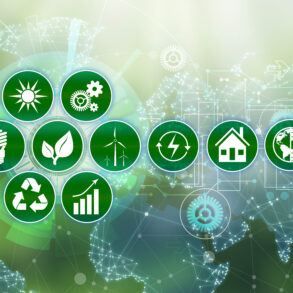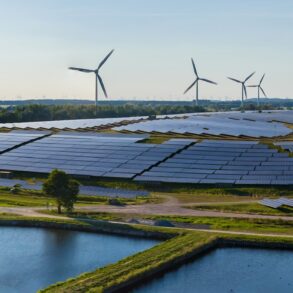Understand why Data Center outsourcing can improve your company’s sustainability rates
8 minutes readingDefinitely, sustainability is not just a buzzword.
If, on the one hand, organizations are facing regulatory pressure to adopt more sustainable processes, on the other, an equally powerful push towards cleaner business practices has come from customers.
And this trend, increasingly intense, has been quickly reflected in the data center market.
Considering that technology parks are among the primary energy consumers and, depending on the energy matrix, among the significant emitters of carbon in the atmosphere, understanding and correctly mitigating the climate impact is urgent.
Given this scenario, Data Centers allocated in the cloud or in Colocation structures collaborate with this objective, essentially by:
- optimize the physical space where equipment is hosted;
- reduce the amount of energy used to cool the data center environment.
But, in practice, how do these service models use energy in a reasonable amount? How do they promote carbon footprint reduction?
Read the full article and understand how Colocation can improve your company’s sustainability indicators, minimizing the environmental impacts of your Data Center.
Clean energy and sustainability
Before advancing on understanding Colocation’s relationship with energy sustainability, it is worth making a caveat: do you understand the concepts of clean energy and green energy?
- Clean energy is the load obtained from sources that do not release air pollutants;
- Green energy is that which comes from natural sources (such as water, wind)
There is a subtle difference between these two types of energy, although they are often said to be the same.
However, not all green energy sources are considered clean. For example, the generation of cargo from fossil fuels, which are resources collected from nature.
But it is not necessarily considered a clean energy source because the burning of elements such as coal is directly related to climate change, among other environmental problems, such as the emission of polluting gases, for example.
Why more companies are focusing on sustainability
Among the key trends highlighted in the IDC FutureScape report: Worldwide Digital Transformation 2021 Predictions, the International Data Corporation (IDC) noted that:
By 2022, most organizations will realize a more excellent value by combining digital transformation and sustainability, giving rise to digitally-driven and sustainable projects by default.
For now, remote work expansion and the insatiable appetite for digital transformation have required from IT and infrastructure teams an increasing dedication to energy sustainability, aware of the potential for such fronts to devastate the environment if not properly addressed.
So organizations that depend on their online networks to provide services and connect with employees and customers need to think about how their IT infrastructure is handling overall energy usage.
Therefore, to become more sustainable, they must strive to make their systems as efficient as possible, looking for ways to do more with less.
It is also worth noting that this premise also directly affects the company’s reputation. For this reason, more and more business customers are demanding greater transparency from their suppliers.
Many are even willing to invest more in solutions based on sustainable practices, with the view that the environmental commitment must reflect all relationship spheres.
For many organizations, IT sustainability is already a high priority, which goes hand in hand with the broader Data Center strategy.
While shifting to cleaner energy sources is very important to reducing greenhouse gas emissions, reducing energy use also plays a critical role.
Thus, an efficient Data Center must spend more energy running IT equipment than cooling the environment where the equipment resides.
How hybrid cloud and Colocation can improve sustainability
If you have a traditional Data Center and want to reduce your company’s carbon footprint, moving your on-premises hardware infrastructure to a Colocation or to a hybrid cloud facility will undoubtedly help improve your sustainability rates.
That’s if you choose a Data Center service provider that generates and consume clean energy for the development of your operations, of course.
Fortunately, thanks to the modernization of structures dedicated to remote Data Centers, promoting this type of change are becoming easier than ever.
Today, companies can quickly migrate existing servers to a Colocation facility, such as those offered by ODATA, and integrate them into a hybrid cloud strategy without developing custom management tools.
Such services separate applications from the specific infrastructure they run on, making it easy to move part of the workloads to public cloud and others into a Colocation facility while the customer manages them in a unified way.
As a result, this flexibility allows enterprise customers to leverage clean energy initiatives from multiple partners simultaneously. Plus, let them update their architectures as the energy consumption landscape continues to evolve.
Therefore, if a given Colocation provider announces a new clean energy initiative that your IT can take advantage of, it would be wise to migrate your workloads to one of that partner’s Data Centers, without your team having to review how they will be deployed or managed.
ODATA Data Centers: commitment to energy and environmental sustainability
At ODATA, the concern with socio-environmental governance is a native characteristic, as its Data Centers installed in various locations in Latin America have followed this guideline since its inception.
Meeting global sustainability standards, they guarantee the operation in synergy with the environment. Thus, their buildings use alternatives for the use of clean energy.
Therefore, the company is committed to carrying out its activities safely and sustainably, promoting the health and safety of employees, customers and the community, as well as following the global precepts of ESG (Environmental, Social and Governance).
In addition, ODATA is implementing a management system based on the ISRS (International Sustainability Rating System), which consists of a system designed to measure, implement and demonstrate the performance of an organization concerning safety, the environment and business.
Through key indicators, reports and continuous process improvements, the company ensures that requirements of international standards are followed.
How ODATA helps to improve your company’s sustainability rates
At this point, you may be wondering how, effectively, the services provided by ODATA could improve your company’s sustainability indicators.
The answer is simple: when moving your traditional Data Center to the infrastructure of a specialized provider – and naturally prepared to give the correct treatment to natural resources -, you automatically minimize the environmental impacts of your Data Center.
Understand why:
1. More efficient cooling
When combined with the Free Cooling system, water cooling allows for more excellent reference and reduces maintenance costs and environmental impact thanks to 30% energy savings.
Conducting heat better than air, water from the cooling sector flows inside coils that reduce the heat emitted inside the Data Center rooms.
Inside the chiller, the water temperature is changed in a closed circuit using external air and free cooling technology, which provides high energy efficiency without water loss.
2. Closed-circuit air conditioning system:
This model provides practically zero water consumption, avoiding the waste of this scarce resource. This way, the water is extracted only once and circulates in a closed circuit, with no need for replacement.
Thus, the same water is heated on the hot side and cooled on the cold side.
There is no evaporation of water in the closed cooling system. On the other hand, an open circuit evaporates, on average, 1% of the installation’s water per hour.
3. Free Cooling System:
It takes advantage of the low outdoor temperature to cool the water, reducing electrical consumption, with the shutdown of chiller compressors and cooling by ambient air.
In this way, it is possible to reduce waste and energy consumption on colder days;
In particular, the integration of the closed-circuit air cooling system with Free Cooling reduces energy consumption, water expending and waste.
4. Adaptation to local needs and scenario:
Each square – be it city, state or country, has its own needs and legislation. And for a company to thrive in it, it’s essential to adapt to local conditions.
Considering that ODATA’s expansion plan in Latin America has been advancing since its foundation, the company naturally understands and fulfils its responsibility to adapt to specific conditions in the region.
Therefore, its team is always focused on adapting activities to the standards and requirements imposed by the environmental licenses of the countries in which it operates;
5. Zero Waste:
Another sustainable initiative that meets current environmental needs, ODATA started the Zero Waste project, which consists of achieving the UL ECVP 2799 (Environmental Claim Validation Procedure for Zero Waste to Landfill) certificate in its Data Centres.
This certificate is vital to attest to your environmentally sustainable business credentials, as it recognizes waste treatment practices with rates equal to or greater than 80%.
6. LEED Gold
Another fundamental certification granted by ODATA is the LEED Gold, which attests to sustainable buildings with high energy efficiency. Thus, it appreciates the reuse of natural resources and an alternative source of energy.
End-to-end sustainable conduct
In addition to these points, it is worth mentioning other details of ODATA’s operation, which show how sustainability is a naturally present value in company’s routine. Its structure maintains:
- parking spaces for electric cars
- rainwater reuse utilization system
- faucets and lighting with sensors and diffusers to reduce water and energy consumption
- solar panels
- use of LED lamps
- presence sensors
- timers in all environments
- collection and final discarding of disposable materials (paper, cardboard, aluminium cans, etc.) in all Data Centers carried out by a licensed company;
- diesel disposal by a supplier specialized in waste disposal and certificate (CADRI);
- collection and final disposal of fluorescent lamps, electronic materials, cells and batteries, in addition to contaminated solids (maintenance waste) carried out by a specialized and certified supplier.
Conclusion
As debates over energy consumption become more intense, business organizations can no longer ignore the impact of their operations, especially when configuring their IT systems.
While clients see their own decisions and behaviour as necessary in the collective effort to reduce environmental impact, most of them believe that the companies they hire are among the entities most responsible for improving overall sustainability results.
For this reason, ODATA is always committed to adopting eco-efficiency programs, seeking new economically viable technologies to optimize the consumption of water, energy and paper, in addition to promoting the conscious use of solid waste.
Exclusive E-BOOKS
to help you learn more about the world of colocation.

Related Posts
SUBSCRIBE TO OUR NEWSLETTER




